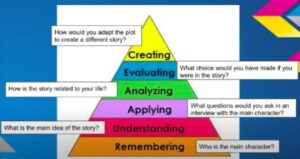30+ Higher-Order Thinking Questions: Your Key to Smarter Thinking

You know that feeling when you’re asked a question and the answer comes so easily you don’t even have to think? Feels good, right?
But what if I told you that’s not always a good thing? If the answer is too obvious, your brain isn’t really doing much work.
That’s where higher-order thinking questions come in.
I’ve been there too—memorizing facts, answering “yes” or “no” questions, and thinking I was acing it. But then I realized something important: real learning happens when you struggle, when you analyze, and when you connect the dots. These questions don’t just test what you know—they make you think deeply.
So how do you find these types of questions?
Don’t worry—keep reading.
What Are Higher-Order Thinking Questions?

You probably ask or answer questions daily. But are those questions truly challenging your brain?
Let’s break it down:
- Lower-order thinking questions: These ask for basic recall.
Example: What is the capital of France? (Easy—Paris!) - Higher-order thinking questions: These require analysis, evaluation, and deeper thought.
Example: How might France’s history have changed if Napoleon had never risen to power?

See the difference?
One asks for a fact. The other forces you to analyze and interpret. Higher-order thinking questions push you beyond memorization—and the more you practice, the better your problem-solving and critical thinking skills become.
👉 Fun fact: A Harvard study found that students who practiced higher-order thinking performed 20% better in problem-solving tasks than those who only focused on memorization.
(Source: Harvard Gazette)
30+ Higher-Order Thinking Questions to Stretch Your Brain
Ready to give your brain a workout? Try answering these thought-provoking questions:
- What evidence would convince you to change your mind about a deeply held belief?
- How can two people witness the same event but interpret it differently—and who’s “right”?
- If a law is unfair, should people still follow it? Why or why not?
- How do personal biases shape the way we interpret facts?
- Can something be true and false at the same time?
- If you had unlimited resources, how would you solve global hunger?
- How do you decide when to take a risk and when to play it safe?
- What’s the best way to resolve a conflict where both sides believe they’re right?
- If you had full control, how would you improve the education system?
- What’s one overlooked global issue that, if solved, could change the world?
- What if gravity suddenly became twice as strong—how would life change?
- If we discovered intelligent alien life, what would be the best way to communicate?
- Can technology ever fully replace human emotions?
- How would you design a city that produces zero pollution?
- Is time travel theoretically possible? What supports or contradicts it?
- If lying could save someone’s life, is it still wrong?
- Should there be limits on scientific research? If so, what should they be?
- Do people have a moral responsibility to help strangers?
- Would you sacrifice one innocent person to save 1,000 lives?
- If you could invent one new technology, what would it be and why?
- How would you redesign the smartphone to make it better?
- What if books never existed—how would people share knowledge?
- Imagine a world without money—how would people exchange goods?
- How would you design a new form of transportation?
- What if World War II had ended differently? How would the world look today?
- How would history be different if social media existed 200 years ago?
- If you could meet any historical figure, who would it be and what would you ask?
- How has the interpretation of historical events changed over time?
- What is one mistake that taught you the most?
- If you had to describe yourself using three life lessons, what would they be?
- How do your personal experiences shape your worldview?
- If you could relive one day of your life, which would it be and why?
- Should AI have legal rights? Why or why not?
- If robots replace most jobs, how should society respond?
Why Higher-Order Thinking Matters in Daily Life?

Think about the smartest people you admire—scientists, inventors, thought leaders. What do they all have in common?
They think differently.
Elon Musk doesn’t just ask, “How do I make a car electric?” He asks, “How do I lead the entire auto industry?”
Steve Jobs didn’t settle for “How do I make smartphones better?”—he asked, “How do I change the way people interact with technology?”
That kind of thinking doesn’t happen overnight. You have to train your brain. But where do you start?
How to Start Thinking Smarter?
You don’t need a fancy degree or years of schooling to start using higher-order thinking. It’s simpler than you think. Here’s a table of strategies you can apply right now:
| Strategy | How to Apply It |
| Ask “Why?” | Dig deeper into facts and reasoning. |
| Challenge Assumptions | Question what you usually take for granted. |
| Make Connections | Relate ideas across subjects or experiences. |
| Think in “What Ifs” | Explore alternate possibilities. |
| Seek Perspectives | Understand other points of view. |
| Analyze Before Judging | Break down ideas logically first. |
| Look for Patterns | Spot trends or repeated behaviors. |
| Creative Problem-Solving | Try new, unexpected approaches. |
| Reflect on Thinking | Question your own thought process. |
Final Thoughts
These questions aren’t just for school—they’re for life. Whether you’re trying to become a better student, a sharper thinker, or just someone who’s more curious about the world, higher-order thinking can help.
And the best part? You can start right now.
So, which question made you pause and think? Try answering it—and let me know which one challenged you the most!




